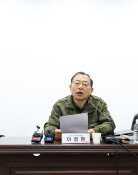Farmers Hit Hard by FTA, Rising Price of Agricultural Materials
Farmers Hit Hard by FTA, Rising Price of Agricultural Materials
Posted February. 25, 2004 23:54,
Because the various prices of agricultural materials, such as fertilizer, chemicals, and films needed for greenhouses, have increased so much this year, many farmers who face the upcoming farming season are depressed.
The raised prices of agricultural materials have contributed to the general increase in agricultural production expenses such as labor costs and agricultural machinery rental fees, adding to the anxieties of farmers who are placed in a difficult situation due to the FTA settlement.
-Agricultural Material Price Increases
The current prices of various agricultural materials have been marked up by 10 percent from those of last year.
According to Nonghyup, urea fertilizer has been marked up from 6,200 won per pack in 2003 to 7,050 won from January 6, showing a 13.7 percent increase. As for agricultural chemicals, among the 447 listed chemicals dealt in Nonghyup, 36 items have been marked up. In case of the films for greenhouse use, thermal insulation and longevity films which were at 2,434 and 2,438 won per a kilogram were increased to 2,763 and 2,767 respectively, recording 13.5 percent increase on average.
In addition, the agricultural pipe which should be established in the installation of greenhouses has been marked up from 669 won per meter in the last year to 749 won in this year, recording a 11.9 percent increase.
The costs of fodder have been also marked up. In case of a middle-sized calf’s fodder, it has been increased from 6,060 won per a pack in the last year to 6,700 won. As for the fodder for egg-laying chickens, a pack costs 6,950 won, showing a 650 won increase from last year.
-Too Hard to Engage in Farming
Shin Je-gyun, 49, a tomato farmer, sighed and said, “From the last September, the prices of agricultural materials started to shake. At last, from January this year, the pipe, fertilizer, and greenhouse film prices have increased in succession, burdening the farmers with an expensive material cost.”
Kim Bok-nam, 52, who raised hundreds of thousands of egg laying chickens in Southern Jeolla Province, remarked that “Since the crisis of bird flu swept over the country, the price of fertilizer has been marked up so much and supply has become insufficient. We don’t receive the fodder unless we provide a mortgage to the fodder manufacturers.”
Oh In-gil, 62, who raises grapes in Northern Chungcheong Province, has become worried and said, “If the agricultural material is marked up, labor costs will follow the tendency. Under the condition of FTA, if the burden of manufacturing costs is added on, only the debt will remain.”
“As the price of ethylene, which is a raw material for producing agricultural film for greenhouse use, has been marked up 40 percent, the raw material prices and marine transport fees have skyrocketed to the 30 to 50 percent level. It is indispensable to increase the price,” remarked a source in Nonghyup’s material department.
-Changing the Method of Agricultural Product Purchase
In order to reduce the burden of farming expenses, farmers assert to change the current method of purchase, a categorical contract between Nonghyup and the material manufacturers into the method in which the local farmers can take part.
“Nonghyup does not use the profits, obtained from material purchases, to reduce the agricultural material price,” remarked Ki Won-ju, the chief of agricultural organization in Kwangju, adding “If the local branches of Nonghyup make progress on the joint purchase, we can stabilize the material purchase because they will obtain the right of price settlement.”







